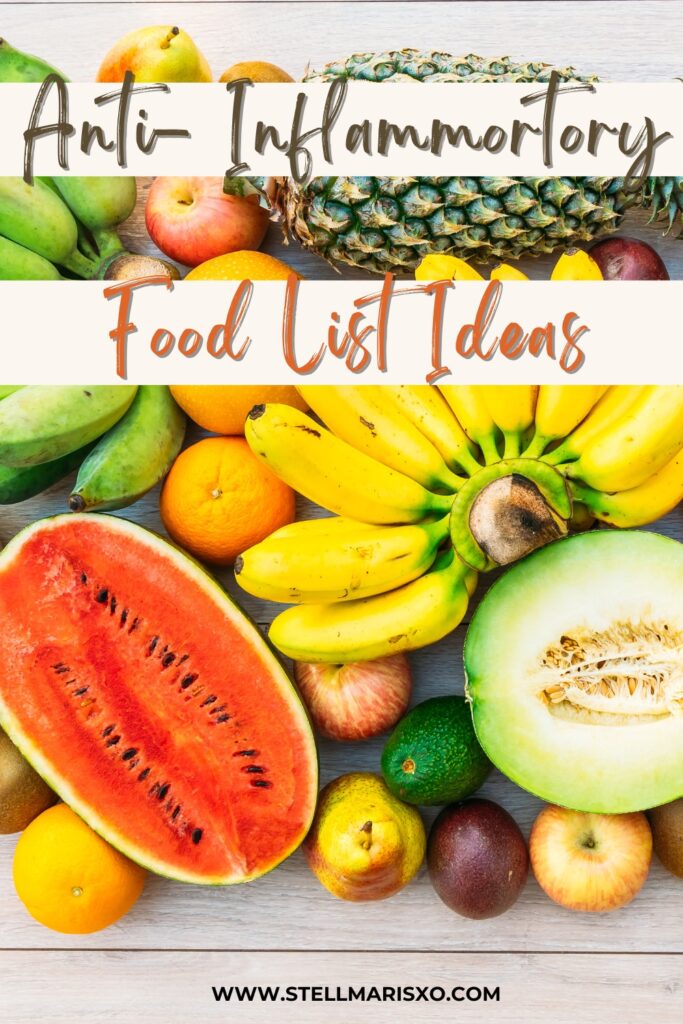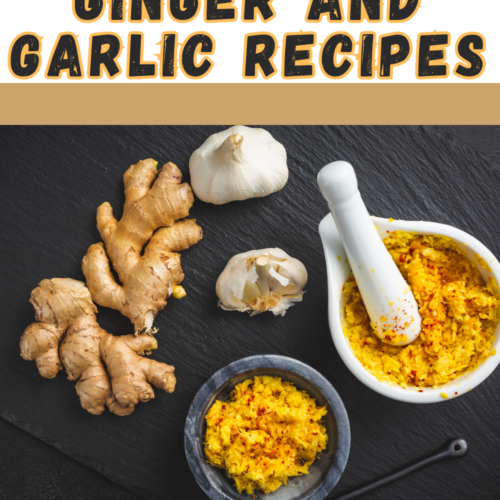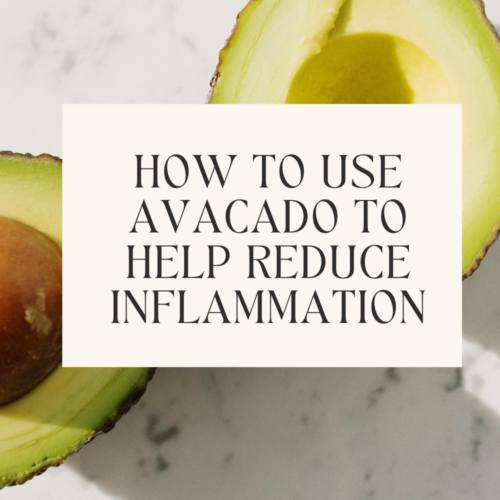This blog post is about anti-inflammatory foods.
Discover how to quickly reduce inflammation in your body by adopting an anti-inflammatory diet! While there are various factors contributing to chronic inflammation, your eating habits are a crucial starting point for improving your health.
Here, I’m sharing an in-depth grocery list idea with its benefits and why these foods are great for combating inflammation. These foods are proven to help guide you toward healing, alleviating pain, and feeling your absolute best.
As someone with a chronic illness myself, I often try and find ways to manage my symptoms through practical and effective means, like incorporating specific anti-inflammatory foods into my diet and drinking an adequate amount of fluids.
Although inflammation is a natural response to injury or illness, chronic inflammation can lead to serious health issues like heart disease, arthritis, and autoimmune conditions.
Let’s combat chronic inflammation effectively by adopting a diet rich in anti-inflammatory foods. Use this straightforward grocery list to fill your cart with ingredients that fight inflammation and support your overall health.

1. Fresh Fruits and Vegetables
Fruits and vegetables are packed with antioxidants, vitamins, and minerals that help reduce inflammation. Aim to fill half your cart with these colorful foods.
- Leafy Greens: Spinach, kale, and Swiss chard are rich in vitamins A, C, and K, and are excellent sources of anti-inflammatory antioxidants.
- Berries: Blueberries, strawberries, and raspberries are low in sugar and high in fiber and antioxidants, making them great for fighting inflammation.
- Cruciferous Vegetables: Broccoli, cauliflower, and Brussels sprouts are known for their high levels of sulforaphane, an anti-inflammatory compound.
- Tomatoes: Rich in lycopene, tomatoes help reduce inflammation, especially when cooked.
- Avocados: High in healthy fats and fiber, avocados are a great anti-inflammatory food that can be added to salads, sandwiches, or eaten on their own.
2. Healthy Fats
Healthy fats are an essential part of an anti-inflammatory diet, providing energy, supporting brain health, and reducing inflammation in the body. Incorporating a variety of healthy fats into your meals can help you maintain a balanced diet while promoting overall wellness. Here are some key sources of healthy fats that you should add to your grocery list:
- Fatty Fish: Salmon, mackerel, sardines, and trout are some of the best sources of omega-3 fatty acids, which help reduce inflammation throughout the body. Aim to include fatty fish in your meals at least twice a week.
- Olive Oil: Extra virgin olive oil is one of the best sources of healthy fats, particularly monounsaturated fats, which are known for their anti-inflammatory properties. Use olive oil for cooking, salad dressings, or drizzling over vegetables.
- Avocados: Avocados are rich in monounsaturated fats, fiber, and antioxidants. They’re versatile and can be added to salads, sandwiches, smoothies, or eaten on their own with a sprinkle of salt.
- Nuts: Nuts like almonds, walnuts, and cashews are excellent sources of healthy fats, fiber, and protein. Walnuts, in particular, are high in omega-3 fatty acids, which have strong anti-inflammatory effects. Enjoy them as a snack, or add them to salads, oatmeal, or yogurt.
- A tangy source of probiotics, sauerkraut can be added to salads, sandwiches, or eaten on its own.
- Seeds: Flaxseeds, chia, and pumpkin seeds are packed with healthy fats, including omega-3s. Flaxseeds and chia seeds are also great sources of fiber and can be added to smoothies, cereals, or baked goods.
- Coconut Oil:Coconut oil contains medium-chain triglycerides (MCTs), which are a type of healthy fat that the body can easily convert into energy. Use coconut oil in cooking or baking, but be mindful of portion sizes due to its high saturated fat content.
3. Whole Grains
Whole grains are a healthier choice than refined grains, as they have more fiber and nutrients that can help lower inflammation.
- Oats: A great source of soluble fiber, oats can help lower cholesterol and inflammation.
- Quinoa: This gluten-free grain is high in protein, fiber, and antioxidants, making it a perfect anti-inflammatory food.
- Brown Rice: Rich in fiber and magnesium, brown rice is a healthier alternative to white rice and can help reduce inflammation.
4. Lean Protein
Incorporating lean protein into your diet is essential for muscle repair and overall health. Opt for proteins that are less likely to cause inflammation.
- Poultry: Chicken and turkey are great sources of lean protein and are less likely to cause inflammation compared to red meats.
- Legumes: Beans, lentils, and chickpeas are high in protein, fiber, and antioxidants, making them an excellent plant-based option.
5. Spices and Herbs
Certain spices and herbs are powerful anti-inflammatory agents that can enhance the flavor of your meals while boosting your health. Anti-inflammatory herbs and spices are natural ingredients that not only add flavor to your meals but also have the health benefit of reducing inflammation. Here are some of the most effective anti-inflammatory herbs and spices to include in your diet:
- Turmeric: Turmeric is a bright yellow spice commonly used in Indian cuisine. Its active compound, curcumin, has powerful anti-inflammatory and antioxidant properties. Turmeric can be added to curries, soups, smoothies, or even taken as a supplement.
- Ginger: Known for its anti-inflammatory and digestive benefits, ginger can be used fresh, dried, or in powder form. Ginger is a root with potent anti-inflammatory effects, thanks to its active compounds, gingerols and shogaols. It can be used fresh, dried, or powdered in teas, stir-fries, baked goods, and smoothies.
- Garlic: Garlic is not only flavorful addition to many dishes but also contains sulfur compounds that have anti-inflammatory effects. Garlic can be used fresh, roasted, or in powdered form in a variety of savory dishes.
- Cinnamon: This sweet spice is high in antioxidants and can help lower inflammation and blood sugar levels.
6. Beverages
Staying hydrated is key to maintaining overall health and reducing inflammation. Choose beverages that support your anti-inflammatory goals.
- Green Tea: Rich in catechins, green tea is known for its anti-inflammatory and antioxidant properties.
- Water: Hydration is crucial for reducing inflammation, so aim to drink plenty of water throughout the day.
- Herbal Teas: Teas made from ginger, turmeric, or chamomile can have soothing, anti-inflammatory effects.
- Juices: Orange, pineapple, and carrot juice freshly squeezed, are great alternatives to conventional store-bought drinks.
7. Fermented Foods
Fermented foods are great for gut health, and a healthy gut can help reduce inflammation throughout the body.
- Yogurt: Choose plain, unsweetened yogurt with live active cultures to support your gut health.
- Kefir: This fermented milk drink is rich in probiotics and can be a great addition to your anti-inflammatory diet.
- Sauerkraut: A tangy source of probiotics, sauerkraut can be added to salads, sandwiches, or eaten on its own.
8. Dairy and Non Dairy Alternatives
- Greek Yogurt: Choose plain, unsweetened yogurt with live active cultures to support your gut health.
- Almond Milk: This fermented milk drink is rich in probiotics and can be a great addition to your anti-inflammatory diet.
- Coconut Milk: A tangy source of probiotics, sauerkraut can be added to salads, sandwiches, or eaten on its own.
9. Other
- Dark Chocolate: Choose plain, unsweetened yogurt with live active cultures to support your gut health.
- Honey: This fermented milk drink is rich in probiotics and can be a great addition to your anti-inflammatory diet.
I hope you found this grocery list helpful as you navigate the grocery stores and shop for foods that combat inflammation and aids in supporting your overall health. The goal is not to try and completely overhaul your diet overnight, but to gradually incorporate more anti-inflammatory foods into your meals. By making small, consistent changes, you can support your overall health and well-being in a sustainable way. Happy shopping, and here’s to nourishing your body with the right choices!






Leave a Reply